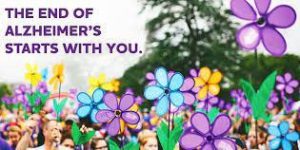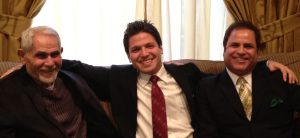Reduce Risk of Alzheimer’s Disease
 Eat Healthy
Eat Healthy
- High vegetable intake
- Moderate dairy product, fish and poultry consumption
- Choose olive or vegetable oil as primary dressing
- Low red meat intake
- Very low sweet and processed food consumption
Stay Social (in a COVID safe way)
- Avoid isolation, connect with others using technology
- Visit with friends and extended family
- Get involved in your community
Stay Active
- Physical exercise – 30 minutes a day, but even a little bit helps
- Mental exercise – challenge yourself by learning something new
- Sleep – keep a regular sleep schedule
Visit https://www.alz.org/help- support/brain_health/adopt_a_healthy_diet
to learn more about brain health and reducing the risk of dementia.
Resources
Ask your primary care physician if they evaluate memory and thinking issues and diagnose dementia.
If not, seek out a specialist below:
- Neurologist, who specializes in diseases of the brain and nervous system
- Geriatrician, who specializes in the care of older adults and dementia
- Psychiatrist, with additional training in mental health and aging
- Psychologist, with special training in neurocognitive testing to assess thinking abilities, memory, attention, language, reading and problem- solving skills
For family care and support:
- Alzheimer’s Association Michigan Chapter – [email protected]; 24/7 helpline 800.272.3900, available in more than 200 languages, including Arabic dialects
- Area Agency on Aging 1-B – direct care programs for seniors https://aaa1b.org
- Arab Community Center for Economic and Social Services (ACCESS) – Living with Alzheimer’s program for Arab American families [email protected]
- Program of All-Inclusive Care for the Elderly (PACE) – http://www.pacesemi.org
- Ask for services that meet your cultural needs
For research and clinical trials on Alzheimer’s disease and related dementia:
- National Institute on Aging – www.nia.nih.gov
- Alzheimer’s Association – www.alz.org/research
For legal counsel on health and financial matters
- Look for attorneys who specialize in elder law
MCCFAD is a Resource Center for Minority Aging Research committed to sharing information about Alzheimer’s disease and related dementias. This content is not intended to be a substitute for professional medical advice, diagnosis, or treatment. Always seek the advice of your physician or other qualified health providers with any questions you may have regarding a medical condition. Never disregard professional medical advice or delay in seeking it because of something you have read in this brochure or on our website (mccfad.isr.umich.edu).
Stages of Alzheimer’s Disease
Alzheimer’s disease progresses over time, though the rate varies for individuals during the three stages.
Early Stage
- Symptoms may not be widely apparent
- Difficulty remembering names when introduced to new people
- Losing or misplacing a valuable object
- Having difficulty performing tasks in social or work settings
Middle Stage
- Feeling moody or withdrawn, especially in socially or mentally challenging situations
- Requiring help choosing proper clothing for the season or the occasion
- Showing an increased tendency to wander and become lost Difficulty in expressing thoughts
- Unable to recall one’s own phone number, address or what high school they attended
- Confusion about location or what day it is
- Difficulty in performing routine tasks without assistance
Late Stage
- Individuals lose the ability to carry on conversations Unable to control movement
- Communicating becomes painful
- Changes in physical abilities, including walking, sitting and eventually swallowing
- More vulnerable to infections, especially pneumonia Round-the-clock care required to keep them safe
Source: Alzheimer’s Association
https://www.alz.org/alzheimers-dementia/stages

Alzheimer’s Disease Care Tips
Grief and Loss when a diagnosis of Alzheimer’s is given
- Feelings of grief and loss are normal
- Denial, anger, guilt, sadness, and acceptance are all part of the grieving process
- As the disease progresses know that you will have feelings of grief and loss again
- Remember these are common emotions
Make giving care a family affair
- Don’t assume others know what help is needed Give the gift of letting people help
- Ask for help–it benefits everyone
- Get as much help as you can–create a community of caring
Planning ahead is the key to success
- Make sure plans are necessary, realistic, and practical
Be flexible
- Take breaks to protect everyone’s health
- Plan daily routines, but change can be okay
- Times change: Respond to COVID-19 challenges
- People have opinions, BUT you are the one who makes decisions for your own family
Visit alz.org/gmc or call the Alzheimer’s Association 24/7 Helpline at 800.272.3900 to learn more about Alzheimer’s Association support groups, educational programs, social engagement programs and more.
Alzheimer’s Association Helpline 800.272.3
900 in multiple languages including Arabic source: https://www.alz.org/help-support/caregiving/caregiver-health MCCFAD resources listed in this brochure
Is it Dementia or Normal Aging?
Signs of Alzheimer’s/Dementia
- Pool judgment and decision making
- Inability to manage a budget
- Losing track of the date or season
- Difficulty having a conversation
- Misplacing things and being unable
- to retrace steps and find them
Is it Dementia or Normal Aging?
Typical age-related changes
- Making a bad decision once in a while
- Missing a monthly payment
- Forgetting which day it is and remembering later
- Sometimes forgetting which work to use
- Losing things from time to time
Visit alz.org/10signs to learn more about warning signs and symptoms of Alzheimer’s. If you notice any of them, don’t ignore them. Schedule an appointment with your doctor. Early diagnosis gives everyone a chance to seek treatment and plan for the future.
Call the Alzheimer’s Association 24/7 Helpline at 800.272.3900 in multiple languages including Arabic dialects
Alzheimer’s Association alz.org/10signs

Arab American Families live with Alzheimer’s disease

